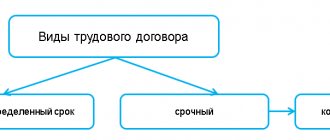From this article you will learn:
- What is a government contract under 44-FZ
- What the customer must include in the contract under 44-FZ
- Stages of concluding a contract under 44-FZ after the auction
- Stages of concluding a contract under 44-FZ with a single supplier
What are the stages of concluding a contract under 44-FZ? Everything here is strictly regulated. On the one hand, this facilitates interaction between counterparties, since it is always easier to work according to plan. On the other hand, the slightest violation of the rules threatens with certain sanctions.
Be that as it may, work under 44-FZ has its own nuances. For example, the procedure for concluding a contract with a single supplier is somewhat different from that prescribed when interacting with the winner of an electronic auction. Therefore, in order to avoid annoying mistakes, it is necessary to carefully study all the provisions of the relevant law.
Mandatory terms of the contract
The mandatory terms of the contract that are included in it at the stage of project formation include the following:
- Conditions on the unchanged price, except in cases where an approximate price value or a formula for calculating it is used. This is provided for agency services, real estate valuation services and compulsory insurance.
- Conditions on the liability of the parties for failure to fulfill or improper performance of their obligations under the contract.
- Conditions that relate to payment for the item of purchase - the procedure, form and deadline for payment, advance payment provisions.
- Conditions for acceptance of the results of contract execution - the procedure and period for its implementation.
- Conditions for securing the execution of the contract - its size, method, period of provision, procedure for return.
Note! If the customer provides in the contract the possibility of its unilateral termination, then these conditions must also be reflected in the contract.
Registration in the ERUZ UIS
From January 1 2020 , in order to participate in bidding under 44-FZ, 223-FZ and 615-PP, registration in the ERUZ register (Unified Register of Procurement Participants) on the EIS (Unified Information System) portal in the field of procurement zakupki.gov is .ru.We provide a service for registration in the ERUZ in the EIS:
Order registration in the EIS
What the customer must include in the contract under 44-FZ
The customer initiating the tender draws up documentation, which should include a draft contract. Thus, all participants in the competition, before the start of the procedure, have the opportunity to obtain information on the terms of the purchase, with the exception of those points that are determined when selecting a specific contractor. The contract, among other things, contains clauses concerning the responsibility of the parties, the procedure and terms of payments, ensuring the execution of the contract, regulations for the acceptance of goods and work, as well as other essential conditions.
The next stage of concluding a contract under 44-FZ is to clarify its provisions based on information regarding the winning bidder. Namely, the transaction cost, supplier details are entered into the project, and the procurement object is specified.
Any government contract, therefore, must contain the following provisions:
1. Transaction cost
The supplier has the right to include in the delivery price all costs associated with the execution of the government contract. This is not only the cost of the goods, but also the costs of its packaging, delivery, including loading and unloading operations and customs duties. But the customer does not have to pay other costs of the supplier.
The specific features of the execution of government orders are the following provisions:
- The price declared by the contractor is reflected in the government contract and is not subject to adjustment during the entire period of its validity.
- Sometimes, instead of a fixed cost, the contract specifies a price formula, the maximum possible delivery amount, or the cost of 1 unit of goods (work, service).
- The source of funding must be indicated.
2. Acceptance of goods and work performed
The rules for transferring goods and work by the supplier are specified in detail in the contract: in what time frame and in what order the activities are carried out, the actions of the parties, the responsible persons and their contacts. The procedure itself is often quite complex, so the text of the contract should include a notification of readiness for acceptance.
Acceptance of goods and work performed records the fact of fulfillment of the supplier’s obligations under the contract, and is therefore documented in a separate document. You can use generally accepted forms of acts of acceptance of goods and acts of work performed.
3. Regulations for settlements between the parties
Payment for delivery is an important stage in the execution of a government contract under 44-FZ. After the acceptance certificate for goods or services (work) is signed, the customer is obliged to transfer money to the supplier belonging to the SMP within 15 working days, and to other categories of enterprises - within 30 days. The entire payment procedure - terms, advances, payment stages - is described in detail in the text of the contract.
4. Securing government contracts
The government contract must contain all the information about the security: in what form it is deposited (money transfer to the customer’s account or provision of a bank guarantee - at the discretion of the contractor), in what order and within what period it should be returned to the contractor.
5. Validity period of the government contract
The draft contract must contain information about the total duration of its validity, as well as the duration of the execution stages. It should be taken into account that the parties are responsible for failure to fulfill obligations even after the expiration of the contract. This condition must certainly be contained in the text (Resolution of the Government of the Russian Federation of August 30, 2017 No. 1042).
6. Making adjustments and terminating the government contract
When concluding such agreements, amendments are allowed only under the circumstances provided for by 44-FZ. If the purchase is small in amount and timing, and also simple in procedure, then the customer may not include this provision in the content of the contract. Also at the discretion of the customer, a clause regarding the possibility of unilateral termination of the contract is included.
7. Terms of the contract
Essential conditions are fixed:
- rights and obligations of the parties. This part must be presented in as much detail as possible, since when conflicts arise, their resolution always becomes a problem;
- criteria for the quality of goods, services, works;
- technology compliance requirements;
- delivery mode;
- conditions relating to the commissioning of equipment, its installation and commissioning;
- list and requirements for documents that the supplier is obliged to provide simultaneously with the procurement object or after completion of the work;
- Force Majeure;
- final provisions;
- details and contact information of the supplier and customer.
Responsibility of the customer and supplier for violation of the provisions of the government contract
For violation of the deadlines for fulfilling the obligations contained in the contract, liability is established in the form of a penalty. They are accrued from the first day of delay in the amount of 1/300 of the current key rate established by the Central Bank of the Russian Federation, which is applied to the monetary value of obligations not fulfilled on time. For example, if the customer does not pay the entire amount on time, then the specified coefficient is applied to the unpaid amount.
All other violations of the terms of the contract that are not related to delay, including non-fulfillment, are punishable by fines. The amounts of fines are fixed and depend on the NMC of the contract. For example, if the customer improperly fulfilled his obligations under the contract, the following penalty will be applied to him:
- 2.5% for NMTsK less than 3 million rubles,
- 2% for NMTsK 3–50 million rubles,
- 1.5% for NMTsK 50–100 million rubles,
- 0.5% for NMTsK more than 100 million rubles.
What opportunities have emerged for conducting electronic small procurements?
The customer will be able to conduct small purchases in the amount of 3 million rubles if such purchases are made using an electronic platform.
The procurement participant will form a preliminary proposal for the supply of goods on the electronic platform. The preliminary proposal will need to include certain information, in particular:
— name and characteristics of the product;
— trademark (if available);
— name of country of origin;
— price per unit of goods;
— the proposed maximum quantity of goods and other information.
The customer places a notice justifying the contract price in the Unified Information System. Within 1 hour from this moment, the operator of the electronic platform selects 5 preliminary proposals with the lowest unit price from those that meet the requirements for the product and the participant established in the notice. If at least 2 proposals are not received, the operator informs the customer about this, places a notice in the Unified Information System and does not send documents to the customer.
The customer has 1 business day to make a decision on the proposals. As a result, he forms a protocol for summing up the supplier determination on the electronic platform. The minutes indicate the decision on each proposal and the rationale for rejecting the applications.
The contract is concluded in a simplified manner provided for a new request for quotations in electronic form. Information about contracts concluded as a result of electronic small procurements will need to be sent to the contract registry.
Terms of payment
Every contract must include information about how it will be paid for. The contract must specify the moment the customer fulfills payment obligations, the deadline, the procedure for payment, as well as the form of payment. The Civil Code provides for four payment options: preliminary, partially preliminary, payment in installments for each stage of work or batch of goods, as well as a one-time payment after execution of the contract.
As for the payment period, it must be clearly stated and cannot depend on the customer receiving financing.
Execution schedule
In Part 12 of Art. 34 44-FZ states that if a contract is concluded for a period of more than three years, and the transaction price is more than 100 million rubles, the government contract must have a schedule for the implementation of the contract. It looks like a table of contract execution deadlines under Federal Law 44.
| No. | Name of work stages | Work start date | Work completion date |
| 1 | Preparatory work | Day of concluding a government contract | No later than 75 (seventy-five) days |
| 2 | Construction of overpass A | No later than 75 (seventy-five) days | No later than 705 (seven hundred five) days |
| 3 | Construction of overpass B | No later than 75 (seventy-five) days | No later than 1020 (one thousand twenty) days |
| 4 | Construction of bridges across the river. Fever | No later than 75 (seventy-five) days | No later than 405 (four hundred five) days |
| 5 | Construction of a bridge across the river. Yauza | No later than 75 (seventy-five) days | No later than 315 (three hundred fifteen) days |
| 6 | Construction of overpass B | No later than 75 (seventy-five) days | No later than 990 (nine hundred ninety) days |
| 7 | Construction of the B1 overpass | No later than 384 (three hundred eighty-four) days | No later than 990 (nine hundred ninety) days |
| 8 | Construction of the B2 overpass | No later than 627 (six hundred twenty-seven) days | No later than 990 (nine hundred ninety) days |
| 9 | Construction of main streets of citywide importance | No later than 600 (six hundred) days | No later than 1020 (one thousand twenty) days |
| 10 | Construction of main streets of district significance | No later than 630 (six hundred thirty) days | No later than 1020 (one thousand twenty) days |
Acceptance of contract results
In addition, in accordance with Part 13 of Article 34 of Law 44-FZ, it is necessary to formulate in the contract the conditions for acceptance of the delivered goods or the result of work performed or services provided. In this case, the contract must indicate the form of the main and additional acceptance documents, the timing of their generation and signing. It is also necessary to add criteria to the contract by which it will be assessed whether the goods (works, services) comply with the requirements established by law and the contract.
When drawing up conditions for acceptance of contract results, we recommend that you be guided by Federal Law No. 184-FZ of December 27, 2002, GOSTs, SNiPs, instructions, standards and other regulatory documents.
What is a government contract under 44-FZ
Transactions concluded between business entities in the field of public procurement are regulated by the provisions of 44-FZ and are formalized in a document called a state contract. The fact is that one of the parties to the transaction is the state customer, purchasing goods, services and work for its own needs.
Government agencies, as well as government agencies at the federal, regional and local levels, can act as government customers. Accordingly, they represent the interests of the state, regions or municipalities.
The second party that enters into a contract under 44-FZ is any legal entity (except for representatives of offshore companies) and individuals, as well as private entrepreneurs. In accordance with the law, certain categories of entities are granted a number of preferences when concluding contracts. In particular, small and medium-sized businesses can count on benefits.
A government contract is a civil contract, the difference from a regular contract is the presence of certain provisions regulated by law 44-FZ due to the fact that one of the counterparties is the state customer.
Let us highlight specific elements of a government contract that are not included in a regular contract:
- The first stage in concluding a government contract under 44-FZ is the competitive procedure for selecting a contractor. This agreement can sometimes be drawn up without holding a tender - in cases regulated by the above-mentioned normative act. The law does not prohibit the organization of competitive procedures for business entities entering into transactions outside the scope of public procurement. Such a mechanism helps enterprises reduce costs, but in practice it is rarely used; usually transactions are concluded by one party providing an offer and its acceptance by the counterparty.
- When concluding a contract under 44-FZ, the terms of all stages are clearly outlined, whereas under a regular contract the parties set the terms at their own request.
- The Civil Code of the Russian Federation defines the concept of essential terms of a contract. In relation to government procurement, they are also relevant, but additional provisions are introduced into the list on the basis of 44-FZ.
- Article 34 of the 44-FZ provides for the mandatory inclusion in the text of a state contract of clauses on the responsibility of the parties for violation of the terms of the contract, and these provisions cannot be changed. When concluding a simple contract, subjects have the right to determine the degree of responsibility themselves or can be guided by the provisions of the Civil Code of the Russian Federation.
Other optional conditions
The contract also contains other conditions, both significant and not. The essential ones include the description of the subject of the contract - its characteristics, parameters, properties. In addition, the contract may include:
- warranty conditions;
- operating conditions, including operating costs;
- conditions that the supplier is obliged to carry out installation and commissioning, as well as train personnel to work with the installed equipment;
- conditions on the place and timing of individual stages of contract execution;
- other conditions that do not contradict the law.
What changes are envisaged in procurement for the implementation of national projects?
As part of the implementation of national projects, the possibility of concluding contracts is established, the subject of which may simultaneously be the preparation of project documentation and (or) the performance of engineering surveys, the performance of construction, reconstruction and (or) major repairs of a capital construction facility, as well as the supply of medical equipment (if this is provided for in the design documentation).
The specified contract can be concluded based on the results of an auction in electronic form or an open competition in electronic form.
If the supplier refuses to sign the contract
The participant in the procedure who is recognized as the winner must enter into a contract without fail, otherwise he will be recognized as having evaded this with all the ensuing consequences. But if this does happen, then the customer must offer to conclude a contract with the supplier who took second place.
First of all, a protocol should be drawn up stating that the first participant evaded concluding a contract. It doesn't matter why he did it. The protocol should indicate information about the procurement, the participant’s data and a link to the norm of law 44-FZ, in accordance with which he was recognized as evading. Within one working day, this protocol should be posted in the Unified Information System. Information about this participant should also be transferred to the register of unscrupulous suppliers.
The customer sends an offer to conclude a contract to the second-place participant within a period not exceeding the deadline for sending the contract to the winner, depending on the type of procurement. The supplier has the opportunity to choose whether to enter into the contract or not. If he agrees, then within the time period established for this type of purchase he transfers to the customer a signed copy and confirmation of the contract security. In case of refusal, the supplier is not recognized as having evaded concluding the contract and, accordingly, this fact does not have negative consequences for him.
Registration in the EIS
When it comes to the register of contracts, many people are primarily interested in the timing of posting information.
The customer has 3 working days to send transaction data to the Federal Treasury, which, in turn, enters it into the register. The law gives the same amount of time to provide information about changes, termination of a document or the execution of a specific stage of a transaction.
The received materials are subject to verification by the Federal Treasury. If there are no errors, then the information and documents are published in the Unified Information System within 3 working days.
Deadline for signing a government contract
The main rule: the contractor always signs first, and the customer - after him. Therefore, deadlines are set for contractors. They depend on how the supplier partner was selected for a government agency or budgetary authority. Each competitive method has its own signature periods. They are shown in Table 1.
Table 1
When must a contractor sign a government contract?
| № | The way the supplier was identified | Supplier signing deadlines |
| Contest | From the moment the protocol was posted | |
| 1 | Open competition | 10 days |
| 2 | Limited Participation Competition | 10 days |
| 3 | Competition in two stages | 10 days |
| 4 | Closed competition | 10 days |
| 5 | Closed competition with limited participation | 10 days |
| 6 | Closed competition in two stages | 10 days |
| Auction | From the date of publication of the protocol or draft contract | |
| 1 | Electronic auction | 5 days |
| 2 | Open auction | 10 days |
| Request for quotation | No earlier than a week and no later than 20 days (indicated in the notice of the request) | |
| Request for proposals | No earlier than a week from the date of publication of the final protocol, no later than 20 days from the date of signing the protocol | |
What can be purchased under an electronic government contract?
There are lists of procurement items, the winner of which must be determined exclusively through an electronic auction. The main one was approved by Decree of the Government of the Russian Federation No. 471-r dated March 21, 2016. The remaining lists are formed by the authorities of the constituent entities of Russia and operate at the regional levels. In addition, the customer may choose an electronic auction as a method of identifying a supplier for any procurement for which the law does not require the procedure to be carried out in any other way.
Government contract ID
In order for government contract data to be included in the appropriate register, it must receive a certain identifier. This is a conditional code number of 25 digits assigned to a contract, unique and inimitable, which cannot belong to any other contract, even with the same contractor and the same customer. The code positions indicate:
- customer identification code;
- the method that has become decisive for the supplier;
- validity period of the contract (beginning and completion);
- serial number of the contract (according to the internal numbering of each individual government customer).
Not all government contracts are required to have an identifier, although it can be assigned—the customer always has the right to do so. This code is mandatory assigned to government orders in the defense sector, as well as in others regulated in Art. 5 part 2 of Federal Law No. 415.
IMPORTANT INFORMATION! From 2021, this identifier, if present, must be indicated in a special field of the invoice, including the adjustment one. Amendments have been made to Art. 169 of the Tax Code of the Russian Federation.
Bargaining
On the appointed day and time, the electronic auction procedure begins. Participants offer the price at which they are willing to fulfill the contract, while others “outbid” it, that is, I offer a lower price. The price step is 0.5% of the NMC of the contract. The supplier has 10 minutes to decide whether to continue bidding. The price that will not be “outbid” by a lower one during this period will become the contract price. And the supplier who offered it, accordingly, will become the winner of the electronic auction.
Section 3. Rights and obligations of the parties
A very important section for both parties, as it contains a description of what is owed and to whom. The Law on the Constitutional Court does not impose requirements for the section, therefore it is drawn up at the discretion of the customer.
Most often, Customers charge themselves with the following responsibilities:
transfer to the supplier of information and documents necessary for delivery of goods;
providing various consultations related to the execution of the contract;
ensuring payment;
monitoring the execution of the contract.
The supplier is required to:
make the delivery.
Application for an open competition in electronic form
An application for an open tender consists of two parts and a proposal for the contract price; they are sent by the participant to the operator of the electronic platform in the form of 3 electronic documents.
Part 4 art. 54.4 44-FZ regulates the complete list of information that must contain the first part of an application for an open competition in electronic form.
Also, in the first part of the application it is prohibited to indicate any information about the supplier and the proposed contract price.
Part 6 art. 54.4 44-FZ establishes a package of documents that the participant must provide in the second part of the application for an open competition in electronic form.
Namely, the second part should contain:
- name of the participant, address, contact telephone number, TIN of the participant, founders, person performing the functions of the sole executive body;
- copies of documents confirming the compliance of goods, work or services with the requirements established in accordance with the legislation of the Russian Federation;
- documents confirming compliance with the uniform requirements of Art. 31 44-FZ (declaration);
- documents confirming the right to receive benefits (for example, as small and medium-sized businesses);
- documents confirming the compliance of goods, work or services with the national regime of Art. 14 44-FZ (if this requirement is established in the documentation);
- documents used to assign points according to criteria (except for information on the quality, functional and environmental characteristics of the procurement object).
All parts of the application are submitted simultaneously using the electronic trading platform. Within one hour after receiving the application, an identification number is assigned to it, and a notification is sent to the participant indicating this number.
Tender Documents and Request for Clarification
If participants have any questions about the tender documentation, they can send a request for clarification of the provisions to the operator of the electronic platform, but no later than 5 days before the deadline for submitting applications. Each supplier can submit no more than 3 such requests.
The customer responds to such a request within 2 working days.
The customer has the right to make changes to the tender documentation no later than 5 days before the deadline for submitting applications. At the same time, he must extend the deadline for accepting applications so that at least 10 working days remain.
Important: changing the procurement object and increasing the application security is not allowed.










